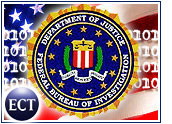
Public comments are due today at the Federal Communications Commission (FCC) regarding a policy proposal instigated by the Federal Bureau of Investigation (FBI) to bolster government surveillance of the Internet.
Last month, the FBI, along with the Drug Enforcement Administration (DEA) and the U.S. Department of Justice (DOJ), filed a petition with the FCC to ask that the agency require ISPs to rewire networks and give the FBI the ability to tap packet-based voice communications.
Voice over Internet Protocol (VoIP), a packet-based voice technology, has grown dramatically in the last two years, and law enforcement personnel have become nervous. Experts tell TechNewsWorld that Internet-based telephone calls account for about 1 percent of all telephone calls made today.
No Subpoena Needed
The FBI has been able to tap electronic communications with a court order for decades. Since the passage of the Patriot Act in the wake of the tragedy inflicted on New York and Washington, D.C., by Islamic fascists on September 11, 2001, the FBI can tap communications without a court order if terrorism is involved.
But the new FBI proposal would increase the agency’s ability to tap new digital communications technologies. The FCC has opened the matter for public comment, and the 30-day commentary period ends at the close of business today.
Some technology experts have noted that tapping packet-based voice communications is quite difficult — akin to complex data mining — but other civil liberties and technology experts are quite fretful.
“There is nothing untappable about packet or Internet technology,” said a statement by the Center for Democracy & Technology, a Washington, D.C.-based civil liberties and Internet public policy group. “Packet services currently available for voice and data are tappable at one or two points in the networks, and service providers are quite willing to work with law enforcement to satisfy interception orders quickly and fully.”
Still, the center cautioned, the Internet is quite different from conventional telephone networks, and federal authorities should not anticipate that surveillance of it will be undertaken with the same ease with which they have tapped the phones of mobsters and other criminals in the past.
FBI To Vet Technologies?
“The digital revolution has produced many means of communication and it is not reasonable to require that all of them identify communications and route traffic the same way that the telephone network does,” said the center’s paper. The center argues that the FBI’s proposal is, at heart, trying to eliminate the diversity of technology services that is the Internet.
The FBI petition with the FCC asks that the government create a regulatory process under which new communications protocols, applications or services must be reviewed and approved by the FBI before they can be deployed.
The FBI also seeks to amend the Communications Assistance for Law Enforcement Act (CALEA), adopted 10 years ago to bolster tapping of digital telephone networks.
Not Without Precedent
The center notes that the FBI’s dramatic proposals are not without precedent. Ten years ago, the FBI asked that new telephone networks be created with specific features in mind to facilitate tapping.
But technology and civil liberties activists are keeping their eye on the feds these days and are fighting to make sure they pursue technology-neutral policies that don’t harm Internet development.
Growth is coming back to the economy, and so is executives’ confidence in the economic recovery — another factor that bodes ill for the FBI proposal. With earnings soaring this quarter for the first time since the first half of 2000 — according to a Thomson Financial First Call forecast released last week — executives may be loath to support a plan that could interfere with technology growth.
Simply put, giving the FBI the power to approve — or deny — new Internet technologies would “destroy the United States’ ability to innovate on the Internet,” said the statement by the Center for Democracy & Technology.




















































